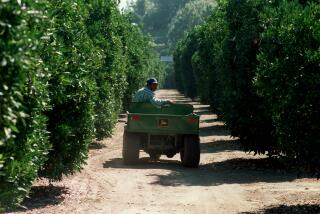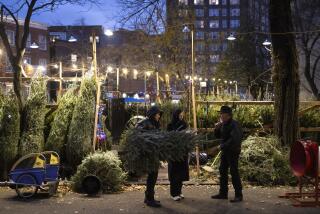Last Orchard Threatened in Appleseed’s Hometown
- Share via
LEOMINSTER, Mass. — Johnny Appleseed’s hometown might lose its last working apple orchard because, after all, money doesn’t grow on trees--it comes from new subdivisions with four-bedroom homes.
The owner of Sholan Farms has asked the city for permission to convert its 50 acres of apple trees and cupola-capped barn into 161 residential lots.
The issue goes to the very core of a place that for years has been dealing with its changing identity from a rural outpost to a Boston bedroom community of 41,000. Leominster (pronounced LEM-in-ster) is also known as Pioneer Plastics City and the birthplace of the plastic pink flamingo.
“How could you let a piece of property like this get developed?” asked David Chandler, who has leased the orchard since 1983 and comes from a long line of apple growers. “It’s just a perfectly gorgeous piece of land.”
With sweeping views of hills to one side and a valley to another, the land could go the way of other farms in the area. Colonial-style housing developments stand on nearby hillsides where cows once grazed and trees once bore fruit.
About an hour’s drive west of Boston, Leominster has attracted people looking for a more pristine and safe place to live. New businesses, particularly in high-tech, have cropped up nearby, bringing young employees with money to spend. New homes sell for as much as $350,000.
Leominster didn’t start capitalizing on its Johnny Appleseed connection until a decade or so ago, when business leaders and city officials realized its marketing power.
Today, the Johnny Appleseed rest stop greets visitors on Route 2 as they approach the city limits. A marker designates the spot where the historical society is “95% sure” Appleseed’s home was built.
And an annual festival in September--marking Appleseed’s birthday, Sept. 26, 1774--honors all things apple and New England, from pies to sauce to orchard-scented candles.
Never mind that Appleseed--real name: John Chapman--only lived in Leominster until he was 6.
A nurseryman and a minister, Appleseed didn’t scatter seeds across the country, as myth has it. He did, however, realize the practical need for apple seedlings and moved ahead of the westward-heading pioneers, starting nurseries with seeds he bought from cider mills in Pennsylvania.
He sold and gave away trees to the struggling settlers, for whom apples were a dietary necessity.
With that history in mind, local folk find a sad irony in the idea of losing Leominster’s last remaining apple orchard.
The land has been owned since 1978 by Dr. Paul Possick, a Leominster native but now a dermatologist in Woodcliff Lake, N.J.
Once the subdivision plans are approved, Possick “probably would either develop it or sell it,” said his lawyer, Peter Dawson.
More to Read
Inside the business of entertainment
The Wide Shot brings you news, analysis and insights on everything from streaming wars to production — and what it all means for the future.
You may occasionally receive promotional content from the Los Angeles Times.










